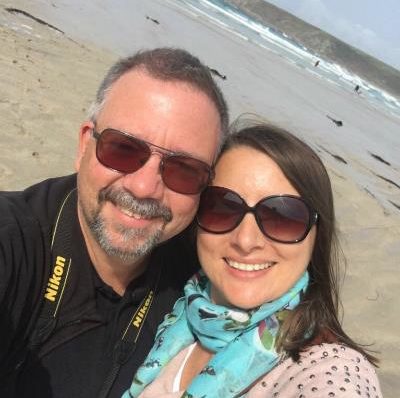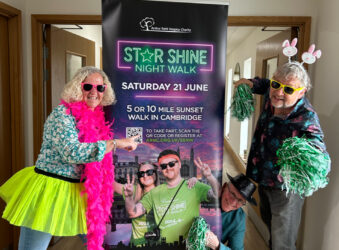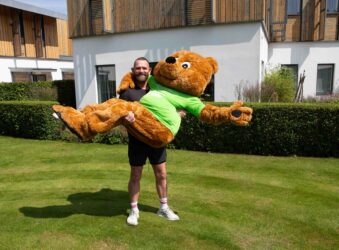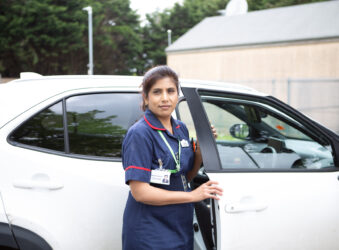Michael’s story
Share this story

Michael’s wife Svitlana was 44 when she passed away in February 2019. She had metastatic breast cancer, which became very aggressive towards the end of her life.
Michael has chosen to tell his story as part of our Help Us Be There campaign, in the hope that more nights of Hospice at Home care can be funded for those that need it such a crucial time.
The Hospice at Home team supported the couple during the last two nights of Svitlana’s life.
“She was very determined as she was in all things, to be at home. That was her wish.”
Svitlana’s strength and determination, was clear to Michael from the moment they first met:
“Svitlana was 13 years younger than me and she came from Ukraine, although she loved Britain and spent just less than half her life here. I met her in Ukraine, in 1997 when I worked for the British Government and she was an interpreter and translator. She was a fantastic linguist. She had learnt English when her country was still part of the former Soviet Union, at a time when access to foreign languages was virtually nil.
She used her linguistics and languages for her own business and set up an investment magazine to try and persuade companies to invest in her country at time when that kind of thing seemed possible. She translated poetry which was published. She would pick up techniques and had no idea what a good sales person she was, until she landed a job selling advertising! She had never done it before in her life and she turned out to be great at it! She was always very determined to see all of these things through – she always brought everything together.”
As Michael explains, she had hundreds of friends:
“What she also brought together was people, because in all these different elements of work and her life, she forged different circles of friends. She was always so likeable and had loads of friends all over the world; many friends still in her own country; loads of friends here; lots of colleagues through work.
She was incredible really because it was always so understated, she was so modest. She never blew her own trumpet. She just got on and did things and she was never in your face. I think that was one of the reasons she had so many friends; why so many people loved her – and I loved her – for who she was.”
The couple had some wonderful times together:
“We shared a love of travel. She loved seeing new places and having new experiences but, equally, she just loved having some friends for dinner or a cup of tea. She was very down to earth. Like me, she was not materialistic in the least and our relationship was based on very simple values which she shared.
Like many people she just wanted to make the world a better place. She came from a country which history has shown has always had great difficulties, but then knew that this was her home and she made the most of her life here and our life together. Which is very special. She was an amazing person, she still is.”
Sadly, Svitlana was diagnosed shortly before her 42nd birthday:
“One of the things that has been really hard about Svitlana’s illness and her passing is the fact that she was only 44 years old. That is a really hard thing to bear for me and for all her friends and family; for everybody that knew her. If it’s possible, I think it has made her passing even sadder and more difficult to comprehend than it already is.”
Svitlana had metastatic breast cancer, which became very aggressive in the later stages of her illness, meaning she spent some time in Addenbrookes Hospital:
“I had cared for her a lot already in the preceding months but earlier on her illness was not affecting her so badly – caring had become just part of my routine without being particularly onerous. When she was in Addenbrookes they asked her where she wanted to be. She was very determined (as she was in all things) to be at home. That was her wish.
I knew that her illness was bad and that she was likely to deteriorate even further and it hit me quite hard that I was the one that everything was going to fall on. Initially, particularly that immediate period coming out of hospital – as she got more and more ill and her disease got more and more aggressive – I felt quite vulnerable because there was just the two of us at home.
I found it very isolating to be providing that kind of care. It was clearly something that I never thought I would have to do, at least not this early in life. It was very isolating. I feel that all of those weeks that I was living in a bubble: I had a vague idea of the outside world going on in the background, almost like background noise. I might occasionally look out the window and notice what the weather was like, but everything paled into insignificance. Everything just drifted away into the background. Our whole world was in that room and that was what mattered.
Of course, at that time, at first, I didn’t know about all the wonderful support that was available. The support that both Svitlana and I had – from the District Nurses, the carers who came in each night and all the support services at Arthur Rank Hospice – in each of their ways, helped to make it a tiny little bit easier.”
Michael explains how the Hospice at Home team provided this much needed support and care, to both of them:
“If we hadn’t had the support that we did have from the Hospice at Home team for those last couple of nights, I think I would have found it extremely difficult. In the preceding three or four days I knew really that things had got quite bad and I remember waiting to call the Hospice on the Monday morning. I just wanted to tell somebody that I was starting to feel like I had gone into a panic and couldn’t deal with the severity of Svitlana’s condition anymore.
That was when the Hospice at Home service was offered to us. Looking back, I think it would have been a big stress on me and I doubt if I could have managed alone. But knowing that the support was planned in a managed kind of way rather than it having to be reactive, helped to maintain the continuity and a sense of calmness and reassurance even though I knew that it was her final stages.
Obviously, it was still the most stressful thing that I have ever had to go through. But, as it transpired, I wasn’t alone all the time. I was able to draw on support whenever I needed it. I was in contact with the specialist nurses at Arthur Rank Hospice all of that time. It was they who prioritised Svitlana for the Hospice at Home service during her last days and helped with pain management and so on.
The Hospice at Home team helped by literally being in the house with me, at home, for what turned out to be the last two nights of Svitlana’s life. Essentially a healthcare worker came to the house and spent the night there, allowing me to be in a separate room to, at least, get some rest, if not some sleep.
They basically took over the caring from me for that period. The healthcare worker was in from about 10 o’clock at night through to the 7 o’clock the following morning. They based themselves in Svitlana’s bedroom and watched her and looked after her all night. They called in the District Nurses as appropriate when medication was required. There was quite a lot for them to do I think, because it was quite close to the end. They basically just looked after her minute by minute for those final two nights. It was incredible.”
Their ‘wrap-around’ support at such a difficult time, made all the difference to Michael:
“As the person who was caring for Svitlana, it was like I was in the front line, for dealing with everything. Responding to all the phone calls from all the agencies and from the Hospice. Even in the early stages, it was clear that they were there to support me as well as Svitlana. I had a lot of conversations with the nurses. I had some psychological counselling. I even had an aromatherapy session at home. It was very much as if we were being cared for as a couple.
In fact – by the time we got to those last few days when Svitlana was very ill – apart from that minute-by-minute care during the night by the Hospice at Home team – most of the direct support was clearly there to help me, as a carer. I think that the balance the organisation achieves, both with the Hospice at Home service but all the other things around it, is wonderful. They don’t just treat that person in isolation. They appreciate that the person caring for them is emotionally and physically right on the edge too. That kind of support, at that time, was absolutely vital. I was really grateful for it.”
It also meant that her final hours were peaceful:
“Svitlana never talked about how she wanted to die because she was very reluctant to talk at all about the end of life. They were just words that she didn’t recognise. All along she had fought against this. She never verbally acknowledged that this was the end. But she wanted to be with me and at home in familiar surroundings rather than somewhere else that she didn’t feel comfortable.
During those last few weeks I know she had experienced a lot of pain and discomfort. The care she had all through her last night from the Hospice at Home healthcare assistant had been really good in just making her calm; it kind of brought her to a state of tranquillity and peacefulness. That was something that I was really grateful for.
In what turned out to be the last hour and a half of Svitlana’s life, it was just the two of us laying together. I held her hand until she stopped breathing. We were just together, and she was very calm and peaceful. I am very grateful that she was able to be in the surroundings that she would have wanted: she was where she wanted to be.”
The idea of bringing the Hospice’s services into people’s homes was new to Michael before he and Svitlana experienced its care:
“I had never heard of this concept before, of actually bringing the services of a hospice into the home of somebody in their latter stages. My very narrow knowledge of a hospice was that it had a certain number of beds for people who are in their last days. I had absolutely no idea of all these outreach services with counselling and all the things that staff do in patients’ and carers’ homes. Keith, the Chaplain, came around a couple of times and he also led Svitlana’s funeral which was wonderful. I had no idea about all this support that sits alongside the Hospice at Home service.
I think that is probably what makes it what it is, because it is part of a wider caring set up. My perception is that it is all part of the way that the team at Arthur Rank Hospice manage the care and a lot of that is about the way communication is handled. The impression I gained was that absolutely nothing was too much trouble – they would always go the extra mile. At a time when I was kind of drained of all my energy, if there was something that I really didn’t have the energy to do – for example a prescription to order – a nurse would arrange to at least contact the GP and I could just go and collect it from the pharmacist without having to make two journeys. So, it was just all little things like that really. It is something that will stay with me and I think it’s really representative of the whole ethos of Arthur Rank Hospice. It is literally a caring organisation at all levels.
I’ve thought this before about people who work in healthcare, at all levels. I think they have to be a special kind of person. The Hospice at Home team clearly were. They are completely selfless. They were clearly there to focus on just the one thing – the patient’s condition and wellbeing during the period they were there. The way in which they were able to focus on just that, be extremely calm and still maintain a very friendly relationship with both Svitlana and me, I just thought was incredible. I am sure that they have a calling to this kind of work. They have to be a special kind of person.”
Losing Svitlana is something Michael is still struggling to come to terms with. He finds some comfort in knowing that, through the support of the Hospice at Home team, he was able to care for her as well as he could:
“It is really hard to lose somebody who is so close to you. Just knowing that they were cared for as well as they could be, and more, gives me a little bit of peace and I am grateful for that.”
Arthur Rank Hospice Charity is aiming to raise £100,000 to fund 200 additional nights of urgently needed Hospice at Home care, over the next year.
A video produced in partnership with Michael, and Mill River TV, you can view this and learn more on our Help Us Be There page.
View other stories
-

Friends walk for Sherrall at Star Shine Night Walk 2025
A group of 18 friends from Royston walk in memory of Motor Neurone Disease Patient, Sherrall
-

Hospice supporter takes on Hyrox challenge in memory of his Coach
Ben Blowes will be taking on 31 Hyrox Challenges in 31 days
-

G Webb Haulage take to the skies for Arthur Rank Hospice Charity
Fifteen courageous members of the team raised an incredible £16,249 for the Charity
-

Cultural Beliefs observed by Hospice at Home Team
Ali passed away peacefully and pain free at home




